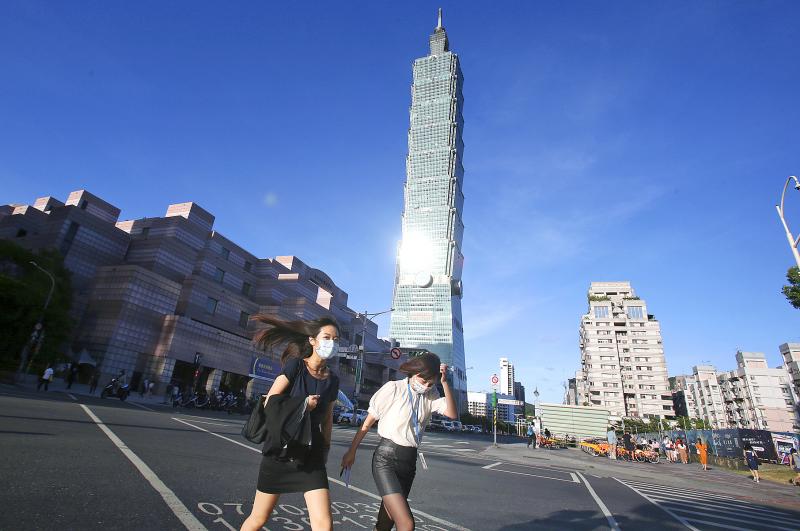Taiwan’s investment ranking rose one position to No. 3, with major risk factors improving compared with the previous assessment in December last year, a report by US-based Business Environment Risk Intelligence SA (BERI) said.
Taiwan scored a higher profit opportunity recommendation of 62, up from 60 in December, tracking behind Norway and Switzerland among the 50 countries assessed by BERI. South Korea was also 62, matching Taiwan’s investment ranking and grade of 1C.
Taiwan is expected to retain the No. 3 position next year, with the score rising slightly to 63, it said.

Photo: AP
BERI issues three investment assessment reports every April, August and December. Three key indicators are used to gauge a country’s investment risk: operations risk, political risk, and a remittance and repatriation factor, or foreign exchange risk.
Taiwan advanced one position in its operations risk ranking to No. 2, next only to the US and better than all its Asian trade competitors, including South Korea at No. 5, China at No. 15 and Singapore at No. 18, the report showed.
Taiwan scored 65 in this category, up from 63 in December.
In operations risk, Taiwan improved in 11 sub-categories, including economic growth, contract execution, and labor cost and productivity, giving it a top 5 ranking.
Taiwan received an improved score of 42 in political risk, up from 38 in December, placing it at No. 24, the report showed.
Taiwan lagged behind its major Asian competitors in this category. Singapore ranked No. 3, while China and Japan ranked No. 5 and No. 7 respectively.
In foreign exchange risk, Taiwan placed No. 1, holding its score of 80 from December, given its excellent foreign exchange reserves, foreign debt and international reserve. South Korea placed at No. 7, Singapore and Japan tied at No. 8 and China placed at No. 12.

MULTIFACETED: A task force has analyzed possible scenarios and created responses to assist domestic industries in dealing with US tariffs, the economics minister said The Executive Yuan is tomorrow to announce countermeasures to US President Donald Trump’s planned reciprocal tariffs, although the details of the plan would not be made public until Monday next week, Minister of Economic Affairs J.W. Kuo (郭智輝) said yesterday. The Cabinet established an economic and trade task force in November last year to deal with US trade and tariff related issues, Kuo told reporters outside the legislature in Taipei. The task force has been analyzing and evaluating all kinds of scenarios to identify suitable responses and determine how best to assist domestic industries in managing the effects of Trump’s tariffs, he

TIGHT-LIPPED: UMC said it had no merger plans at the moment, after Nikkei Asia reported that the firm and GlobalFoundries were considering restarting merger talks United Microelectronics Corp (UMC, 聯電), the world’s No. 4 contract chipmaker, yesterday launched a new US$5 billion 12-inch chip factory in Singapore as part of its latest effort to diversify its manufacturing footprint amid growing geopolitical risks. The new factory, adjacent to UMC’s existing Singapore fab in the Pasir Res Wafer Fab Park, is scheduled to enter volume production next year, utilizing mature 22-nanometer and 28-nanometer process technologies, UMC said in a statement. The company plans to invest US$5 billion during the first phase of the new fab, which would have an installed capacity of 30,000 12-inch wafers per month, it said. The

Taiwan’s official purchasing managers’ index (PMI) last month rose 0.2 percentage points to 54.2, in a second consecutive month of expansion, thanks to front-loading demand intended to avoid potential US tariff hikes, the Chung-Hua Institution for Economic Research (CIER, 中華經濟研究院) said yesterday. While short-term demand appeared robust, uncertainties rose due to US President Donald Trump’s unpredictable trade policy, CIER president Lien Hsien-ming (連賢明) told a news conference in Taipei. Taiwan’s economy this year would be characterized by high-level fluctuations and the volatility would be wilder than most expect, Lien said Demand for electronics, particularly semiconductors, continues to benefit from US technology giants’ effort

‘SWASTICAR’: Tesla CEO Elon Musk’s close association with Donald Trump has prompted opponents to brand him a ‘Nazi’ and resulted in a dramatic drop in sales Demonstrators descended on Tesla Inc dealerships across the US, and in Europe and Canada on Saturday to protest company chief Elon Musk, who has amassed extraordinary power as a top adviser to US President Donald Trump. Waving signs with messages such as “Musk is stealing our money” and “Reclaim our country,” the protests largely took place peacefully following fiery episodes of vandalism on Tesla vehicles, dealerships and other facilities in recent weeks that US officials have denounced as terrorism. Hundreds rallied on Saturday outside the Tesla dealership in Manhattan. Some blasted Musk, the world’s richest man, while others demanded the shuttering of his